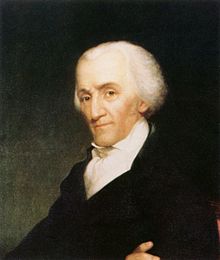Elbridge Gerry
Elbridge Gerry | |
|---|---|
 | |
| 5th Vice President | |
| In office March 4, 1813 – November 23, 1814 | |
| President | James Madison |
| Preceded by | George Clinton |
| Succeeded by | Daniel D. Tompkins |
| Personal details | |
| Born | July 17, 1744 Marblehead, Massachusetts |
| Died | November 23, 1814 Washington, D.C. |
| Nationality | american |
| Political party | Democratic-Republican Party |
| Spouse | Ann Thompson |
Elbridge Thomas Gerry (July 17, 1744 – November 23, 1814) was an American politician, a member of the Jeffersonian Republican Party. He was the fifth Vice President of the United States, serving under James Madison, from March 4, 1813 until his death. He was the second Vice President to die in office; the first to have died in office was Gerry's immediate predecessor, George Clinton, who served under Thomas Jefferson and James Madison.
Gerry was one of the signers of the Declaration of Independence and the Articles of Confederation. He was one of the three men who refused to sign the Constitution because it did not have a Bill of Rights. Another one of the delegates who refused to sign is George Mason. Elbridge Gerry later became governor of Massachusetts. He is most famous for being the namesake of gerrymandering — a process by which electoral districts are drawn with the aim of aiding the party in power.
Early life
Born in Marblehead, Massachusetts, the third of twelve children, he was a graduate of Harvard College, where he studied to be a merchant, attending there from age fourteen. He worked in his father's shipping business and came to prominence over his opposition to commerce taxes. He was elected to the General Court of the province of Massachusetts in May 1772 on an anti-British platform.
Career
Gerry was a Massachusetts delegate to the Continental Congress from February 1776 to 1780. He also served from 1783 to September 1785 and was married in 1786 to Ann Thompson, the daughter of a wealthy New York merchant, 21 years his junior. In 1787 he attended the United States Constitutional Convention and was one of the delegates voting against the new constitution (joining Mason and Randolph in not signing it). He was elected to the U.S. House under the new national government, and served in Congress from 1789 to 1793. He surprised his friends by becoming a strong supporter of the new government, and so vigorously supported Hamilton's reports on public credit, including the assumption of state debts, and supported Hamilton's new Bank of the United States, that he was considered a leading champion by the Federalists. He did not stand for reelection in 1792. He was a presidential elector for John Adams in the 1796 election, and was appointed by Adams to the critical delegation to France that was humiliated by the French in the XYZ Affair. He stayed in France after his two colleagues returned, and Federalists accused him of supporting the French. He returned in October 1798, and switched his affiliation to Jefferson's Republican party in 1800.
He was the unsuccessful Republican nominee for governor of Massachusetts in 1800, 1801, 1802 and 1803. In 1810 he was finally elected Governor of Massachusetts as a Republican. He was re-elected in 1811 but defeated in 1812 over his support for the redistricting bill that created the word gerrymander. Despite this he was chosen as vice president to James Madison. He died in office in Washington, D.C. and is buried there in the Congressional Cemetery.
Legacy
Gerry's longtime house, the historic Elmwood mansion in Cambridge, Massachusetts, was birthplace to noted poet James Russell Lowell a few years after Gerry's death. His grandson, Elbridge Gerry (1813–1886), was a Member of the U.S. House of Representatives from Maine; his great grandson, Peter G. Gerry, was a Member of the U.S. House of Representatives and United States Senator from Rhode Island.
Quotes
- "The evils we experience flow from the excess of democracy. The people do not want virtue, but are dupes of pretended patriots"[1]
References and sources
- ^ Government By The People, The Dynamics of American National, State, and Local Government, James MacGregor Burns & Jack Walter Peltason, 6th edition, Prentice-Hall, Inc., Englewood Cliffs, NJ, 1963. pg 50.
- United States Congress. "Elbridge Gerry (id: G000139)". Biographical Directory of the United States Congress.
- Austin, James, Life of Elbridge Gerry 1970; Da Capo Press (ISBN 0306718413).
- Billias, George, Elbridge Gerry, Founding Father and Republican Statesman 1976, McGraw-Hill Publishers (ISBN 0070052697).
- Kramer, Eugene F. "Some New Light on the XYZ Affair: Elbridge Gerry's Reasons for Opposing War with France." New England Quarterly 1956 29(4): 509-513. Issn: 0028-4866
- Trees, Andy. "Private Correspondence for the Public Good: Thomas Jefferson to Elbridge Gerry, 26 January 1799" Virginia Magazine of History and Biography 2000 108(3): 217-254. Issn: 0042-6636 shows Gerry ignored Jefferson's 1799 letter inviting him to switch parties.
- 1744 births
- 1814 deaths
- Continental Congressmen
- Founding Fathers of the United States
- Governors of Massachusetts
- Members of the United States House of Representatives from Massachusetts
- People from Massachusetts
- Quasi-War people
- Signers of the U.S. Declaration of Independence
- Vice Presidents of the United States

